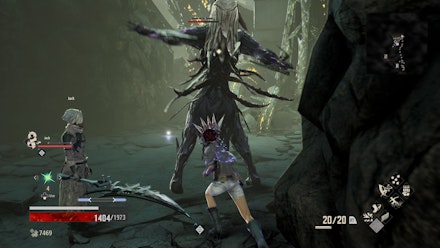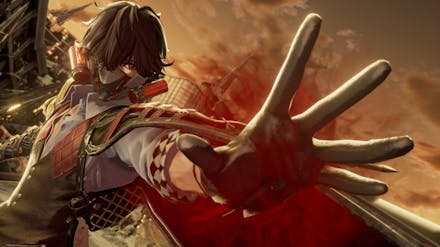"Dark Souls, but anime" is the elevator pitch for this quasi-gothic post-apocalyptic action title, and that's pretty much exactly what you can expect from the end result – with a few twists and upgrades along the way.
Code Vein is set in a nebulously near future where humanity has been all but wiped out by a great cataclysm, and the ruins populated by monsters. 'Revenants' were created to fight against the darkness, but must consume blood to retain their faculties. If they don't, they become Lost – feral and unthinking. As you'll discover making your way through the game, there are a lot of Revenants who have become Lost, adding to the perils of this fallen world.
At the merest glance, Code Vein is an unsubtle Dark Souls clone, mechanically. The world is made up of mapped locations with specifically placed enemies, attack patterns and weapon specialities must be learned, and it's all capped by encounters with gargantuan bosses that any reasonable person wouldn't even consider approaching. Even the controller mapping feels similar.
However, give it some time and you'll find plenty of modifications to the formula that help it stand alone. One is the character customiser, which is one of the most impressive seen for these sorts of games. Given the anime roots, it's also surprisingly diverse, with a huge range of ethnicities and body types available.
Another is combat. Broadly, it's faster and smoother even with heavy weapons, and while attacks and dodges still deplete a stamina bar, you have far more freedom in how you fight. You play a Revenant with skills beyond the norm – of course – able to take on enemies' "blood codes" when you defeat them. These are essentially class modifiers, allowing you to swap core abilities around on the fly. Codes also bequeath Gifts – or skills, if you prefer non-specific jargon – which can be mapped to a quick menu to unleash special moves, or unlock passive bonuses as you play.
A particularly nice touch is permanently learning Gifts after using them a certain amount. Learned Gifts from one Blood Code can then be mixed and matched, for truly varied character development. Between the constant freedom of customisation and the cleaner combat, it all feels a lot more fluid, which will appeal to anyone who tires of the staid pace and rigidity of the Souls games.

The other major difference in Code Vein is its story, which is... convoluted. It's the direct opposite of Dark Souls, where you may have to dig for years to uncover some subtle hint of lore for the world. Whether that approach is preferable or not will be a matter of personal taste, but having a clearer narrative to hang the game's events on certainly makes for a more immediately engaging experience. A choice between original Japanese voices and English dub is nice, too.
Sadly, Code Vein's biggest problem may be its approach to female characters. It's the end of the world, and women are still running around apparently sporting Wonderbras, breasts barely-concealed beneath torn tops. While there's some more freedom – and clothing – if you create a female avatar, most of the presets are worryingly scantily clad, while non-player lady characters are overwhelmingly objectified.
While Code Vein clearly suffered some hurdles, being originally slated for release in 2018, the added year of development time has at least resulted in a unique spin on how the genre plays. It's just a shame its female characters are so poorly presented.
